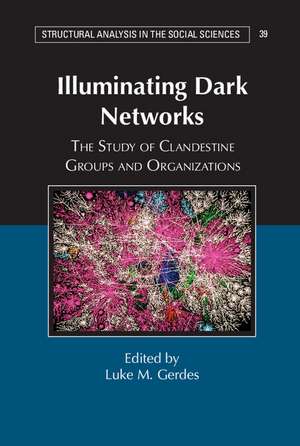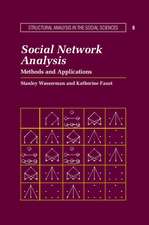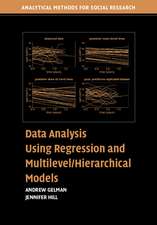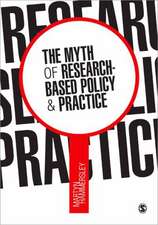Illuminating Dark Networks: The Study of Clandestine Groups and Organizations: Structural Analysis in the Social Sciences, cartea 39
Editat de Luke M. Gerdesen Limba Engleză Hardback – 22 iul 2015
Din seria Structural Analysis in the Social Sciences
-
 Preț: 411.44 lei
Preț: 411.44 lei -
 Preț: 232.67 lei
Preț: 232.67 lei -
 Preț: 394.00 lei
Preț: 394.00 lei -
 Preț: 195.77 lei
Preț: 195.77 lei -
 Preț: 306.57 lei
Preț: 306.57 lei -
 Preț: 226.46 lei
Preț: 226.46 lei -
 Preț: 289.30 lei
Preț: 289.30 lei -
 Preț: 287.48 lei
Preț: 287.48 lei -
 Preț: 238.07 lei
Preț: 238.07 lei -
 Preț: 351.15 lei
Preț: 351.15 lei -
 Preț: 338.80 lei
Preț: 338.80 lei - 11%
 Preț: 546.03 lei
Preț: 546.03 lei -
 Preț: 434.92 lei
Preț: 434.92 lei -
 Preț: 286.30 lei
Preț: 286.30 lei -
 Preț: 378.11 lei
Preț: 378.11 lei -
 Preț: 323.65 lei
Preț: 323.65 lei -
 Preț: 334.16 lei
Preț: 334.16 lei -
 Preț: 284.56 lei
Preț: 284.56 lei -
 Preț: 236.40 lei
Preț: 236.40 lei -
 Preț: 349.80 lei
Preț: 349.80 lei -
 Preț: 300.79 lei
Preț: 300.79 lei -
 Preț: 421.39 lei
Preț: 421.39 lei -
 Preț: 284.56 lei
Preț: 284.56 lei -
 Preț: 368.31 lei
Preț: 368.31 lei - 11%
 Preț: 520.83 lei
Preț: 520.83 lei -
 Preț: 277.97 lei
Preț: 277.97 lei -
 Preț: 381.45 lei
Preț: 381.45 lei - 11%
 Preț: 646.96 lei
Preț: 646.96 lei -
 Preț: 250.30 lei
Preț: 250.30 lei -
 Preț: 208.61 lei
Preț: 208.61 lei
Preț: 696.26 lei
Preț vechi: 782.31 lei
-11% Nou
Puncte Express: 1044
Preț estimativ în valută:
133.27€ • 144.81$ • 112.02£
133.27€ • 144.81$ • 112.02£
Carte tipărită la comandă
Livrare economică 22 aprilie-06 mai
Preluare comenzi: 021 569.72.76
Specificații
ISBN-13: 9781107102699
ISBN-10: 1107102693
Pagini: 276
Ilustrații: 71 b/w illus. 27 tables
Dimensiuni: 160 x 236 x 24 mm
Greutate: 0.58 kg
Editura: Cambridge University Press
Colecția Cambridge University Press
Seria Structural Analysis in the Social Sciences
Locul publicării:New York, United States
ISBN-10: 1107102693
Pagini: 276
Ilustrații: 71 b/w illus. 27 tables
Dimensiuni: 160 x 236 x 24 mm
Greutate: 0.58 kg
Editura: Cambridge University Press
Colecția Cambridge University Press
Seria Structural Analysis in the Social Sciences
Locul publicării:New York, United States
Cuprins
Introduction Luke M. Gerdes; 1. Covert network analysis: an exchange network theory perspective Elisa Jayne Bienenstock and Michael Salwen; 2. Dark dimensions: classifying relationships among clandestine actors Luke M. Gerdes; 3. Disrupting and dismantling dark networks: lessons from social network analysis and law enforcement simulations David A. Bright; 4. The methodological challenges of extracting dark networks: minimizing false positives through ethnography Michael Kenney and Stephen Coulthart; 5. Detecting dark networks using geo-temporal and pattern based network analysis techniques Rich La Valley, Abe Usher and Alexander Halman; 6. LookingGlass: a visual intelligence platform for tracking social movements Hasan Davulcu and Mark Woodward; 7. Open source exploitation for understanding covert networks Kathleen M. Carley; 8. Simulating and analyzing dark networks: modeling and measuring using network tools David C. Arney, Jocelyn R. Bell, Kathryn A. Coronges and Greg Merkl; 9. Criminal social network intelligence analysis with the GANG software Paulo Shakarian, Michael Martin, John Bertetto, Bradley Fischl, Joseph Hannigan, Guillermo Hernandez, Evan Kenney, Jacob Lademan, Damon Paulo and Christian Young; 10. A new approach for identification of multiple threat scenarios to counter CBRN networks Ronald Breiger and Lauren Pinson; 11. Casting more light on dark networks: a stochastic actor-oriented longitudinal analysis of the Noordin top terrorist network Daniel Cunningham, Sean F. Everton and Philip J. Murphy; 12. Generating illicit networks: multi-level agent-based modeling and network formation rules among extremists Steve Scheinert; 13. Challenges to understanding covert groups Carl A. B. Pearson, Burton H. Singer and Edo Airoldi; 14. Dynamic actor-oriented models as a tool for the analysis of dark networks in a multiply connected actor-oriented environment Marc Anthony Johnson, Anthony N. Johnson and David C. Arney.
Recenzii
'Social network analysis is now a well-established paradigm within the social sciences and has been successfully applied to various types of relational data. However, until now, too little attention has been paid to how it should be applied to dark networks. Illuminating Dark Networks brings together leading academics, military researchers, and civilian analysts to provide the reader with the latest thinking on how to collect, analyze, and understand clandestine networks. Challenging traditional thinking and proposing new methods and ideas, this volume is timely, informative, and engaging.' Martin Everett, Chair in Social Network Analysis, Mitchell Centre, University of Manchester
'Illuminating Dark Networks: The Study of Clandestine Groups and Organizations is a rare book title in that it conveys exactly what the book actually delivers. Drawing on work from some of the best researchers in this area, both from the policy world and academia, across fields as diverse as sociology, statistics, and computer science, this edited volume makes an important contribution to our understanding of dark networks and how to study them.' Victor Asal, University at Albany, State University of New York
'Illuminating Dark Networks: The Study of Clandestine Groups and Organizations is a rare book title in that it conveys exactly what the book actually delivers. Drawing on work from some of the best researchers in this area, both from the policy world and academia, across fields as diverse as sociology, statistics, and computer science, this edited volume makes an important contribution to our understanding of dark networks and how to study them.' Victor Asal, University at Albany, State University of New York
Descriere
Illuminating Dark Networks discusses new necessary methods to understand dark networks, because these clandestine groups differ from transparent organizations.















